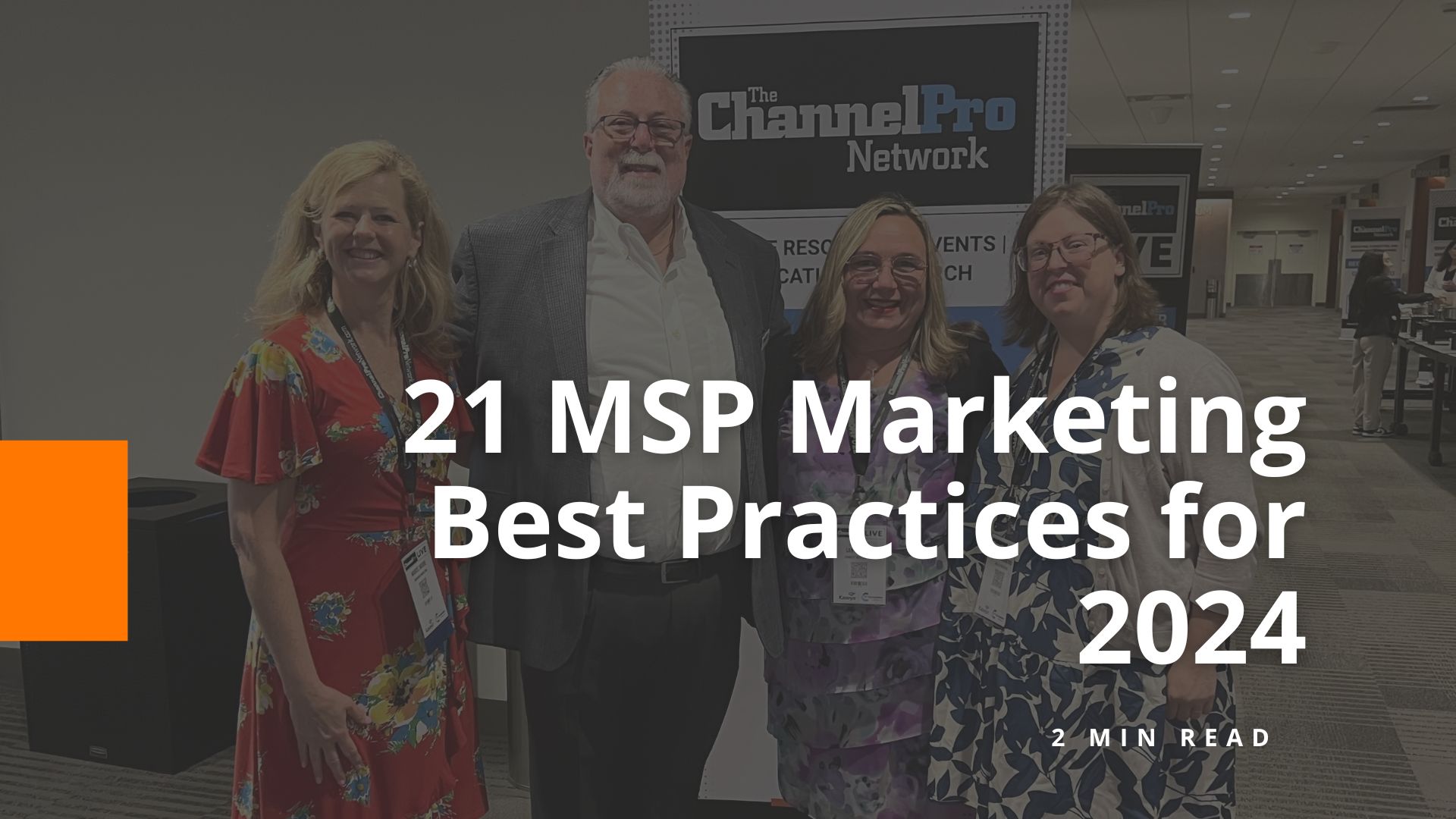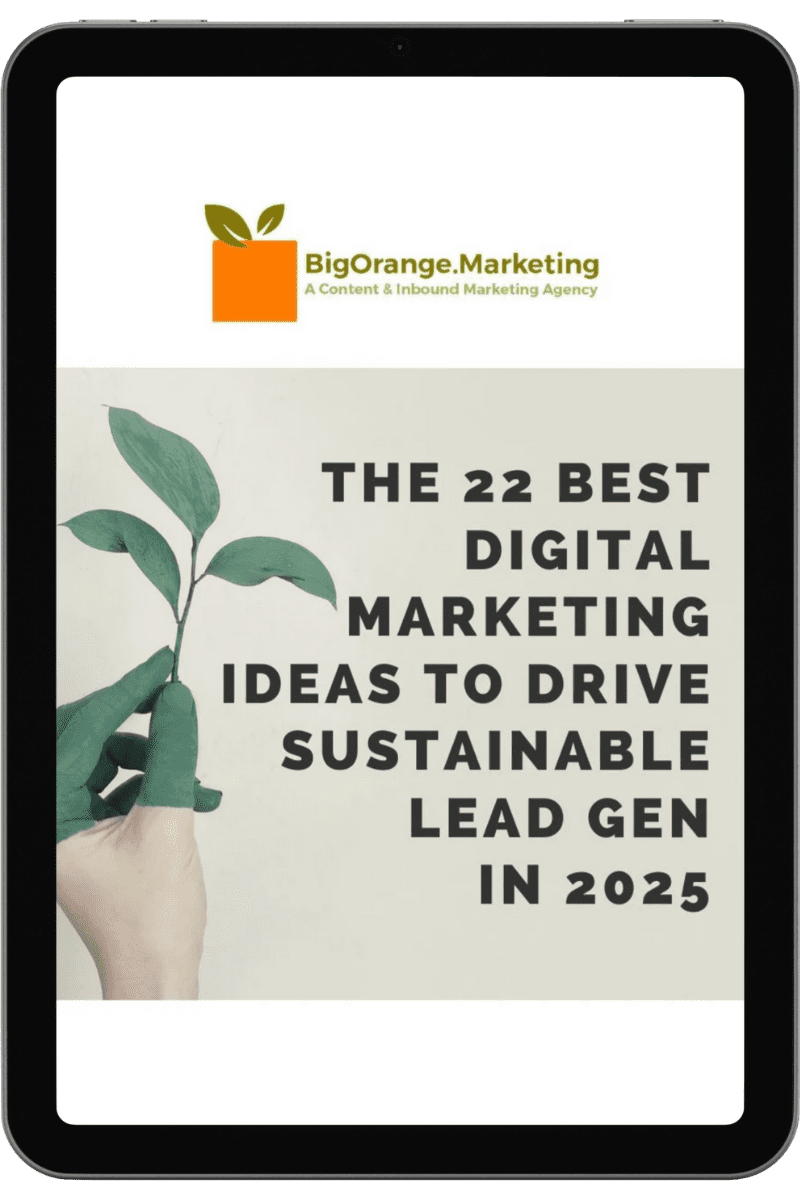5 Fundamentals of Inbound Marketing for MSPs

As a managed service provider (MSP), your expertise lies in keeping IT systems running smoothly. But when it comes to marketing, it can feel like navigating uncharted territory. That’s where inbound marketing comes in as a proven strategy for attracting leads and converting them into loyal customers. Let’s explore the 5 fundamentals of inbound marketing tailored for MSPs to help your business grow.
1. Know Your Ideal Customer Profile (Buyer Personas)
You can’t effectively market your services without knowing who you’re trying to reach. Your ideal customer profile helps you focus on the right audience and businesses that truly need your services.
How to Do It:
- Identify industries you serve best, such as healthcare, manufacturing or legal services.
- Define company size, common IT pain points and decision-makers (CEOs, IT managers and key stakeholders).
- Create detailed buyer personas to tailor your messaging to their specific challenges, like outdated technology, cybersecurity concerns or a need for scalable IT solutions.
💡 When you know your audience inside and out, your marketing efforts hit the mark every time!
2. Deliver Clear, Concise and Relatable Content (StoryBrand)
Businesses look for MSPs to solve their IT challenges. Offering valuable, informational content will position your company as a brand authority in your field.
How to Do It:
- Simplify your marketing message and connect with more customers by following the StoryBrand methodology. Making the customer the hero makes your brand more relatable and encourages engagement.
- Write blogs, whitepapers and ebooks that address pain points like “How to Prevent Ransomware” or “Choosing the Right Cloud Service.”
- Use SEO to optimize content for keywords your audience is searching for, such as “IT support for SMBs” or “managed cloud services.”
- Diversify with videos that market your product or services, webinars and infographics to cater to different content preferences.
3. Optimize Your Website for Conversions (SEO)
Your website is your digital calling card. It’s where potential clients decide whether to engage with you further. A strong website will communicate your unique value proposition effectively, setting you apart from competitors. It’s important for your website to do more than just look good. It should also make it easy for potential clients to find you when they need your services.
How to Do It:
- Improve search engine optimization (SEO) by using strong, relevant keywords, creating high-quality content and ensuring meta tags and descriptions are in place.
- Implement clear calls to action (CTAs) like “Schedule a Free IT Assessment” or “Download Our Cybersecurity Checklist.”
- Use dedicated landing pages for campaigns to collect visitor information through lead forms.
- Ensure your site is mobile-friendly, fast and easy to navigate.
4. Leverage Email Marketing (Lead Nurturing)
Email is one of the most cost-effective tools for nurturing leads and staying on top of prospects. It allows you to maintain regular communication with potential clients and showcase your expertise through valuable content.
How to Do It:
- Segment your email lists based on industries, company size or lead stage to ensure personalized communication.
- Share newsletters filled with tech tips, case studies or product updates.
- Use automated workflows to follow up with leads after they download a resource or attend a webinar.
💡 Use catchy subject lines like “3 Ways to Boost Cybersecurity at Your Business” to grab the attention of your audience and increase engagement.
5. Measure and Refine Your Strategy
Marketing isn’t a one-and-done effort. Regularly analyzing your results ensures you’re focusing on what works.
How to Do It:
- Use tools like Google Analytics or HubSpot to track website traffic, conversion rates and lead quality.
- Evaluate which blog topics, CTAs or email campaigns perform best.
- Regularly update your content and strategies based on data insights and changing market trends.
Why Inbound Marketing Works for MSPs
Inbound marketing focuses on attracting, engaging and delighting your target audience. Instead of chasing leads, you’re drawing them to you with valuable resources and insights. For MSPs, this approach builds trust and demonstrates your ability to solve complex IT challenges before the sales pitch even begins.
By implementing these 5 fundamentals of inbound marketing, your MSP business will not only attract qualified leads but also convert them into loyal clients who see the value in your expertise.
Ready to Implement the 5 Fundamentals of Inbound Marketing?
At BigOrange Marketing, we specialize in helping MSPs grow through strategic inbound marketing. From creating SEO-optimized content to designing lead-generating websites, we’ve got the tools and expertise to elevate your marketing game.
Contact us today and discover how we can help your MSP thrive in a competitive market using the 5 fundamentals of inbound marketing and more.
Share the knowledge
How to Tell the Tale: What Is a StoryBrand BrandScript?
What Is a StoryBrand BrandScript? A StoryBrand BrandScript is a script that summarizes your key message as an exciting and easily readable story. It’s based…
Explore this TopicGet Leads And Grow: 21 MSP Marketing Best Practices for 2024
Our own CEO Margee Moore presented her talk to ChannelPro in June. We were delighted to share MSP marketing best practices for 2024 and marketing…
Explore this TopicHow Is a StoryBrand Brandscript Used?
A StoryBrand Brandscript is a powerful tool that helps businesses clarify their messaging by structuring their brand story in a way that resonates with their…
Explore this TopicWhat Is the Purpose of StoryBrand?
The purpose of StoryBrand is to help businesses clarify their messaging so they can more personally and clearly communicate with their customers. By using the…
Explore this TopicIs StoryBrand Free?
On its website, StoryBrand offers various resources, some of which are free, such as the StoryBrand podcast and blog. However, more comprehensive resources, like the…
Explore this TopicIs It Worth It to Become a StoryBrand Guide?
Becoming a StoryBrand Guide can be worth it for those looking to enhance their marketing expertise and help businesses communicate more personally with their audiences.…
Explore this TopicWhat Are Examples of a StoryBrand Website?
An example of a StoryBrand website includes Internos Group’s website, which explains the company’s Miami IT services. The site clearly appeals to the customer’s goals,…
Explore this TopicWhat Is the Process Plan of StoryBrand?
The StoryBrand process and its plan are based on a framework designed by Donald Miller to help businesses more effectively communicate their core messages to…
Explore this Topic









